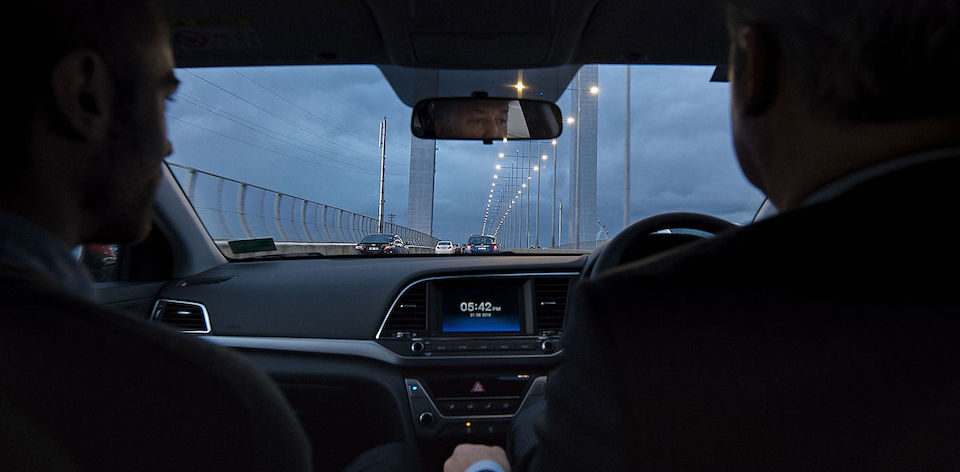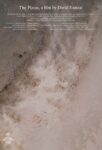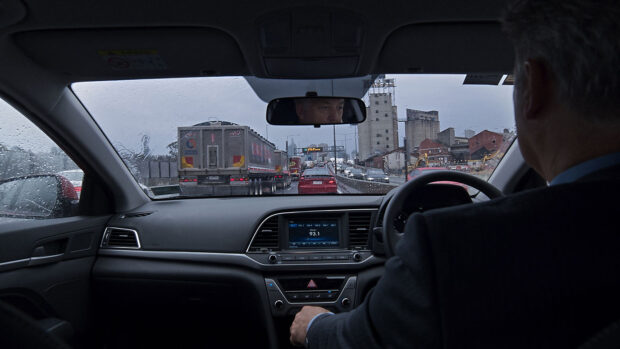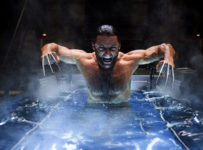Following a series of festival shorts, Melbourne-based filmmaker David Easteal has released his debut feature THE PLAINS onto the world stage. Premiering as part of the International Film Festival Rotterdam’s prestigious Tiger Competition, it is only the second Australian film to do so in the award’s history.
The premise for Easteal’s film is simplicity itself: each day the middle-aged Andrew (Andrew Rakowski), who works at a legal centre, makes the commute from work to home around 5pm. He’s sometimes accompanied by a younger coworker, but is more often than not on the phone to his ailing mother or his wife Cheri.
There have been so many gimmicks in local indie films over the last few years – be it one-take dramas or entirely improvised rom-coms – that it is often difficult to find the truly unique. So, it was with some degree of scepticism that I approached this three hour series of conversations, ones mostly shot from the back seat of a car. While it had the potential to be a monotonous series of vignettes, or the drag of the daily commute rendered in real time, what instead unfurls is an incredibly layered film that partly channels Abbas Kiarostami or Jafar Panahi’s use of cars as a narrative tool.
Although Easteal puts us in the back seat of the car for the lengthy running time, there are some incredibly judicious choices about what we see and hear. Treading a fine line between documentary and fictional narrative styles, this is a strangely compelling and addictive approach painstakingly shot over 12 months of Melbourne traffic. When it breaks away, through seemingly randomly inserted drone shots of the country from Andrew’s home life, we know we’re only seeing part of the story. It’s a kind of installation art told through the techniques of reality television or maybe even social media.
On the surface, Andrew is the kind of driver’s seat companion some may find a bit chatty, constantly talking and explaining his choices. Yet clues emerge as to the lead’s true state of mind: he’s rarely quiet, but he will avoid allowing his companion (and by extension the audience) from knowing his true state of mind. He mentions his wife, but we never learn much beyond her name. In a fleeting moment, she’s glimpsed in the drone footage. There’s a handful of scenes when an awkward and lingering hush follows thoughts of his mother’s eventual passing, leaving both his young coworker and the viewer unsure how to react. The silence, when it arrives, is deafening.
After two years of isolation and social distancing around the world, this observational piece arrives on a wave of similarly themed mediations. (Mexico’s Malintzin 17 or Japan’s Nowhere to Go But Everywhere, for example, are also playing at IFFR this year). Yet there’s an understated profundity in Easteal’s leisurely paced film, showing that you can spend all the time in the world with someone and never really know them.
2022 | Australia | DIRECTOR: David Easteal | WRITERS: David Easteal | CAST: Andrew Rakowski, David Easteal, Cheri LeCornu, Inga Rakowski | DISTRIBUTOR: International Film Festival Rotterdam 2022 (NL) | RUNNING TIME: 180 minutes | RELEASE DATE: 26 January – 6 February 2022 (IFFR)







